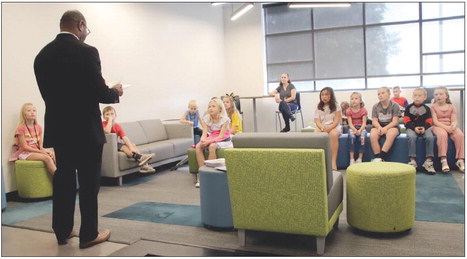It’s electric!












EPA, Cassville schools celebrate 5 new electric buses
By Kyle Troutman [email protected]
The Cassville school district and Environmental Protection Agency joined on Thursday to celebrate a $1.9 million investment at the district — five new electric school buses paid for entirely by the Clean School Bus Rebate Program.
Merlyn Johnson, Cassville superintendent, said the buses have been in service for the last few weeks, receiving rave reviews from riders and athletic teams that have used them.
“We’ve been able to get buses on school routes and taken teams to games in neighboring communities, and they’ve done great so far,” he said. “The one comment we continue to hear from our kids, coaches, drivers and staff is we can actually have a conversation on the bus without yelling.”
Cassville is one of 25 districts in the state to receive funding through the program, and one of 392 nationwide, making the district a leader in transforming bus fleets to become more environmentally friendly.
DeAndré Singletary, director of the Air and Radiation Division of the EPA’s Region 7, said about 25 million students in the U.S. ride a bus to and from school each day.
“Many of those buses have diesel engines and release massive amounts of pollution into our environment,” he said. “Diesel air pollution is linked to asthma and other conditions that can harm students’ health and even cause them to miss school.”
The Clean Bus Program awarded $1 billion nationwide and will make $1 billion available annually through 2026.
“You are all leaders in helping transform school bus fleets across the nation,” he said. “Our hope is clean school buses will become the standard across the country, leading to less air pollution, better air quality and better health for students.”
The funding is part of the Bipartisan Infrastructure Law, and Missouri districts received approximately $22.5 million to purchase 57 buses, according to the EPA. The program also delivers on President Joe Biden’s Justice40 Initiative, which aims to deliver 40 percent of the overall benefits of certain federal investments to disadvantaged communities that are marginalized, underserved and overburdened by pollution.
“The Bipartisan Infrastructure Law provides $5 billion for decarbonizing our nation’s school bus fleet,” Singletary said. “EPA Region 7 is proud to see a portion of this historic funding go to Cassville school district, providing a cleaner mode of transportation for students.”
“This visit marks a significant milestone for our district as we proudly showcase the successful integration of five state-of-the-art electric buses into our fleet,” Johnson said. “We believe that these federally funded buses will enhance the overall safety and comfort of our students. We are thankful to the EPA for recognizing our efforts and for approving our grant application.”
Leading the learning curve at Cassville when it comes to operation and maintenance of the buses is Jake Kloss, transportation director, who said he never expected to be in this position.
“When I was initially asked if we should put in for the grant, I thought, no way,“ he said. “I know diesels but I don’t know electric. I really didn’t think we’d get it to be honest. What’s the chance? But, here we are sitting today with five electric buses.
“It’s been a really good experience and I never really thought I’d be in this position but here I am learning electric and how things operate. There’s been a lot of learning going on and it’s a very exciting time. There’s been some hiccups, but we got through them, able to react quick and get things fixed. We’re using software that’s more advanced than the diesel buses and that really makes a change for the whole bus. It’s been a tremendous experience.”
Experiencing the buses for the first time recently was a Cassville second-grader, Keegan Thompson, who spoke to the crowd of abut 40 people gathered at the event.
“This week I got to ride a new electric bus for the first time,” he said. “I immediately noticed the bus was clean, and when I walked up to the front of the bus, the bus driver turned it on and the dashboard was like a video game. After the bus was turned on, I didn’t hear anything at all. It was very quiet. My bus driver told me the quiet humming sound that we could hear was actually a speaker to help people outside be safe.
“My bus driver took me to the charging station, and I have never seen anything like that before. The fact there were small charges and big chargers was really cool. My bus driver also told me that if we lost power at the school we can use the electric bus to supply power again.”
Thompson said through all the awe of what the buses do, or don’t do in regards to noise, there is one aspect he is excited to take advantage of as temperatures drop.
“The one thing I’m most excited about is if it’s cold outside when we ride the bus in the morning, my bus driver can turn on a timer to warm the bus up,” he said. “I am so excited to ride this bus this year.”
Johnson said from the district’s perspective, the awarding of the grant and efficiency of the buses will provide multi-pronged opportunities for savings.
“A year and a half ago, we did not think we’d do anything like this, and it will be a great savings for our district over several years,” he said. “For the next few years, we will not be buying as many buses, and that’s a savings right there. We are still learning about the savings on the fuel and maintenance side.”
Kloss said along with the savings, he’s excited to see what the five new buses do for the fleet as a whole.
“The drivers are enjoying it and the kids are enjoying it,” he said. “I had the opportunity to take the football team to Aurora a couple weeks ago, and all the comments were great. When we took off, they couldn’t believe how quiet it is and how you can have conversations while going down the road. It’s a great piece of equipment we get to use thanks to the EPA and Clean Bus Grant.
Johnson said the buses also provide a great learning opportunity, not just for the kids, but the adults in our community as well, about clean energy.
“We are an example for other school districts, not just in Missouri, but in the whole nation,” he said.
Singletary thanked Cassville for applying for the grant and wished the district well.
“I am thankful for the team at Cassville for submitting their application for trailblazing the way toward climate resilience in this area,” he said. “I hope you enjoy your fleet of clean school buses.”
Johnson and Kloss also thanked other partners in attendance, including representatives from Barry Electric Cooperative, MidWest Transit and the IC Bus Corporation.
Prior to the speakers, Singletary read a “Magic School Bus” book to select Cassville students in second and third grades, as well as the Cassville Middle School Student Council, all of whom were taken on a bus ride around district property afterward and served a special pizza lunch.




